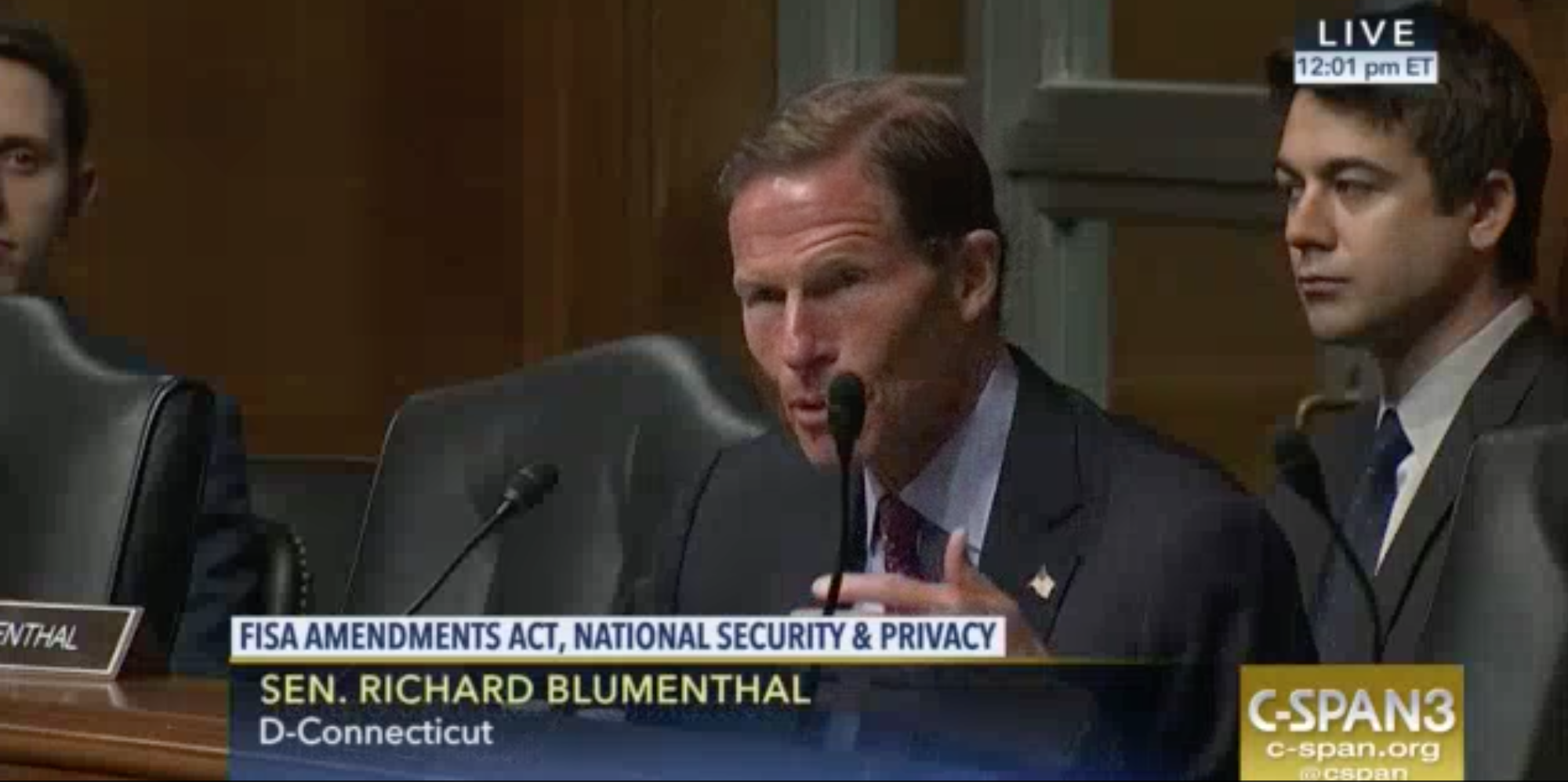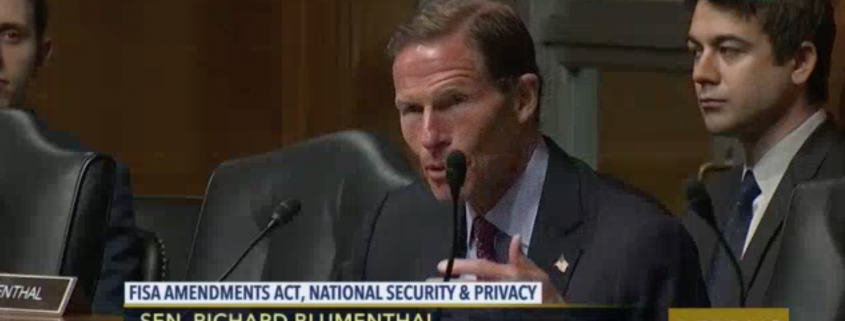USA Freedom Act Booster Misses Opportunity to Note FISC Blew off USAF
The Brennan’s Center Liza Goitein is the privacy community’s go-to witness for Section 702 hearings. She’s a decent choice: she’s unflappable, she has worked in Congress (which nevertheless doesn’t prevent members from routinely butchering her name), and she’s superb at invoking case law to support her points. She has a fine understanding of how the program is implemented.
But she did, in my opinion, affirmative damage in today’s hearing on Section 702.
The most ardent supporter for a special advocate in the FISA Court, Richard Blumenthal, asked the panel if the provision could be improved. All witnesses supported a FISA amicus, with both Goitein and CNAS’ Adam Klein supporting some strengthening of the provision.
But Goitein misstated how the current provision for an amicus — passed as law as part of USA Freedom Act — has been implemented. After calling the provision “a really important contribution of the USA Freedom Act,” Goitein claimed “for the most part the Court has” appointed an amicus for a novel or significant legal issue. [my transcription]
Goitein: I think that was a really important contribution of the USA Freedom Act. I think it’s very clear from the act that Congress intended for the FISA Court to make use of amici in really any case in which there was a novel or significant legal issue unless there were some extraordinary circumstances. I think for the most part the Court has done that. There have been a couple of occasions in which the court has found participation inappropriate based on the rationale that the Court just didn’t need help. I don’t think that’s really consistent with what was intended. But that’s been rare. That’s something I think this committee should keep an eye on. I do think it makes sense to have participation in the annual certification process be mandatory, and the one other thing I would suggest is that there’s currently no provision for amici to appeal rulings of the FISA Court if the amici’s arguments were rejected. And sometimes that’s important. I think we saw in the FISA Court’s decision on back door searches — there were a number of, to say the least, very novel legal issues that would have benefitted from review.
Except the Court hasn’t always appointed, much less considered, appointing an amicus.
Just two months ago, Rosemary Collyer permitted the back door searches of collection that she explicitly admitted can include entirely domestic communications. The decision goes well beyond what John Bates authorized in 2011 when he permitted back door searches, because Bates specifically excluded the upstream collection he knew to include entirely domestic communications.
Collyer approved that practice on top of all the other issues she ruled on, such as the sharing of raw data with NCTC (which will permit it to do back door searches for designations without the due process FBI provides) and letting NSA keep reports it developed using legally prohibited queries. Moreover, it came in an opinion where Collyer appeared to be unclear on the technical aspects of the question in front of her, resulting in an opinion that leaves little clarity on whether ending “about” collection (which was never defined in technical terms) will actually end the collection of unrelated American targets.
And not only didn’t Collyer appoint an amicus to deal with this difficult technical and legal issue. She didn’t even consider it, as mandated by USA Freedom Act.
A court established under subsection (a) or (b), consistent with the requirement of subsection (c) and any other statutory requirement that the court act expeditiously or within a stated time–
(A) shall appoint an individual who has been designated under paragraph (1) to serve as amicus curiae to assist such court in the consideration of any application for an order or review that, in the opinion of the court, presents a novel or significant interpretation of the law, unless the court issues a finding that such appointment is not appropriate;
I have asked some people on the Hill whether they consider this decision an significant opinion or not, and had mixed responses (meaning at least some of the privacy focused congressional figures I spoke with would have been okay with Collyer finding that she didn’t need an amicus or even are okay that she didn’t consider it).
But this question was an opportunity for the privacy community to point out to the amicus’ chief booster — and three other witnesses who generally support the amicus provision — how the FISC can and did in a hugely significant ruling sidestep necessary input. At the very least, it was an opportunity to point out that permitting the judges to decide what constitutes a significant legal issue permits too much discretion, because it allows the FISC to avoid justifying not appointing an amicus.
Instead of making those points, Goitein instead answered in a way that suggested she believes the first time approval of back door searches on content that includes entirely domestic collection is not a significant legal issue.






“Except the Court hasn’t always appointed, much less considered, appointing an amicus.” That’s quite a straw man… I never said the FISA Court “always” assigns an amicus. I said that it did so in most significant cases, which is factually accurate. I also said that it did not appoint an amicus in a couple of cases, and that this is a problem. And I was explicit that back door searches present “novel legal issues.” I realize you would have preferred for me to make a big deal over Collyer’s failure to appoint an amicus, and you may be right that it was a missed opportunity. But I hardly think it rises to level of doing “affirmative damage.”
I would have liked if you had pointed out that the FISC violated USAF as written, because she didn’t even consider one or explain why she didn’t. Collyer’s is the one opinion since passage of USAF, much less since its official start date, that doesn’t even consider an amicus, thereby violating the letter of the law.
That seems worth pointing out, especially as it bolsters the importance of making an amicus mandatory for programmatic decision.
And yes, I would have preferred if you had pointed out that on the operative opinion for the topic of the hearing the court did not use an amicus, and therefore all the operative assurances being made in that hearing are rendered uncertain.
I appreciate your testimony on such issues. It’s just unfortunate you have a mostly passing grade to amicus rather than pointing out the presiding judge may have just created huge problems by ignoring the law.
Ok, instead of calling it ‘affirmative damage’, how about ‘non-affirmative damage prevention’?
Do you have an opinion on what groups within IC should NOT be allowed to do back-door searches?